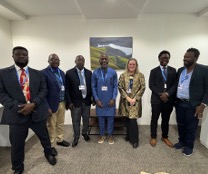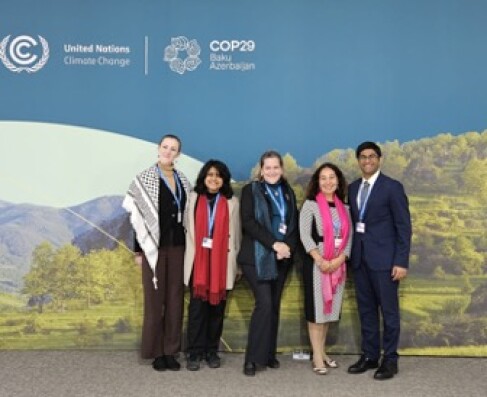Building Global Capacity for Climate Law and Governance at COP 29

In mid-November, members of the Democratising Education for Global Sustainability and Justice Programme (DemEd Global) team travelled to Baku, Azerbaijan for the 29th United Nations Conference of the Parties (COP 29) to the United Nations Framework Convention on Climate Change (UNFCCC). Throughout the week, the team co-hosted a Climate Law & Governance Day event, drawing over 3,400 registrants; offered training to over 1100 learners through a Climate Law & Governance Specialisation Course; and signed agreements with ministers from four countries, providing 750 full scholarships for future law and policy leaders.
The team (pictured below) included Professor Marie-Claire Cordonnier Segger, Chair of the DemEd Global; Adv Maeve McDermott, Programme Coordinator; Adv Tejas Rao, Programme Research Coordinator; Dr Antoinette Nester, Programme Advisor; and Dr. Markus Gehring, Programme Advisor (not pictured).

Left to right: Adv Maeve McDermott, Ananya Chaudhuri, Prof Marie-Claire Cordonnier Segger, Dr Antoinette Nester, and Adv Tejas Rao, posed for a photo at COP29 in Baku.
After months of preparation, the team set their work into motion, co-hosting Climate Law & Governance Day (CLGD), joined by leading academics and practitioners from the Climate Law & Governance Initiative (CLGI), ADA University in Baku, the International Law Association, the International Bar Association, and the Centre for International Sustainable Development Law. A record 3400 individuals from across the globe registered to attend CLGD this year, hailing from 154 different countries. Over 110 leading legal experts spoke at the full-day online symposium, which featured a grand opening, three high-level plenaries, and thirteen substantive expert-led sessions addressing a wide range of pressing climate law and governance challenges and solutions. The day saw facilitators and participants discuss progress towards Paris Agreement implementation since the last year, and new tools for global cooperation – including integrating indigenous law within governments, trade treaties, and public- and private-sector investment.
The DemEd Global team then turned their focus to the 2024 Climate Law & Governance Specialisation Course. The course, chaired by Prof Marie-Claire Cordonier Segger and Prof Rashad Ibadov (Dean of the School of Law at ADA University), offered training to a new generation of climate specialists worldwide, supporting their efforts to advance climate law and governance implementation. Taught by leading professors and global experts, it provided a foundational understanding of the Paris Agreement under the UNFCCC and included sessions on Law, Governance & Climate Mitigation; Climate Law & Governance on Adaptation, Loss and Damage; and Climate Law & Governance on Finance, Compliance & Transparency. Three breakout sessions, led by the experts, also allowed participants to share country experiences and analyse climate law and policy approaches with colleagues from around the world. More than 1100 learners registered for this year’s course, which was offered remotely and in-person at ADA University.
In-person learners convene for a lecture during the Climate Law and Governance Specialisation Course.
Leaders pose with their certificates of completion issued by the Centre for International Sustainable Development Law (CISDL)
Striving to build legal capacity in highly climate vulnerable countries through expanding access to cutting-edge education, the team also met with ministers from Bangladesh, Liberia, Pakistan, and Sierra Leone to forge new partnerships. These partnerships will provide 750 future law and policy leaders full scholarships to enrol in DemEd Global courses. Scholarships will permit learners from aforementioned countries to complete between two and six of DemEd Global’s most popular substantive courses – a major stride towards democratising education for global sustainability and justice.
Prof Marie-Claire Cordonnier Segger celebrates signing a Letter of Agreement to provide 150 scholarships to Bangladeshi law and policy leaders.
Speaking to ministers from Liberia, Prof Cordonnier Segger said: “We are delighted to collaborate with the [Liberian] EPA to offer these courses... The course aligns with the goals of the Paris Agreement and will strengthen legal capacity in sustainable development law and policy.” She echoed her sentiment to ministers from each of the scholarship agreement countries.
Celebrating the provision of 300 scholarships to Sierra Leonean law and policy leaders.
Ministers and representatives of the scholarship-recipient countries welcomed the agreements with equal excitement. Syed Bulent Sohail, the head of Program and Partnerships at the Institute of Business Administration in Karachi, Pakistan, commented on the role of the scholarships in advancing climate resilience.
“Partnerships with universities like Cambridge can help incorporate global best practices and cutting-edge research into Pakistan’s climate education curriculum. Government bodies must lead by example, but they need the knowledge and tools to enact policies that are both responsive and forward-thinking in terms of climate resilience. With collaboration between the government, industries, academia, and international partners, Pakistan can fulfil its climate commitments and transition towards a sustainable future, in line with the global goals of the Paris Agreement.”
Prof Marie-Claire Cordonnier Segger signs a Letter of Agreement with ministers from Liberia to provide 150 scholarships.
Speaking at the signing ceremony, Dr. Emmanuel K. Urey Yarkpawolo, Executive Director of the Environmental Protection Agency of Liberia, also expressed his hopes for the benefits of the partnership.
“On behalf of the Government of Liberia and our team here in Baku, Azerbaijan we want to thank the Centre for International Sustainable Development Law and the University of Cambridge for this opportunity. This program will build the capacity of Liberians interested in environmental law and governance as well as sustainable development, which is vital as we work on developing our climate law in Liberia and contributing to the national development agenda of Liberia.”
Current and future law and policy leaders from any sector around the world will soon be able to apply for a place in DemEd Global’s Spring 2025 courses. To find out more, especially if interested in supporting the programme, please write in the first instance to the Research Coordinator, Tejas Rao: tr465@cam.ac.uk.
Across the week in Baku, the DemEd Global team worked to build law and policy capacity to address climate change, particularly in developing and highly climate vulnerable countries. From co-hosting a Climate Law & Governance Day, to running a Climate Law & Governance Specialisation Course, to signing scholarships agreements for 750 future learners – for DemEd Global, COP29 was a time for building connections, sharing wisdom, and working together towards the implementation of climate law and governance.
Blog by The Democratising Education for Global Sustainability and Justice Programme

